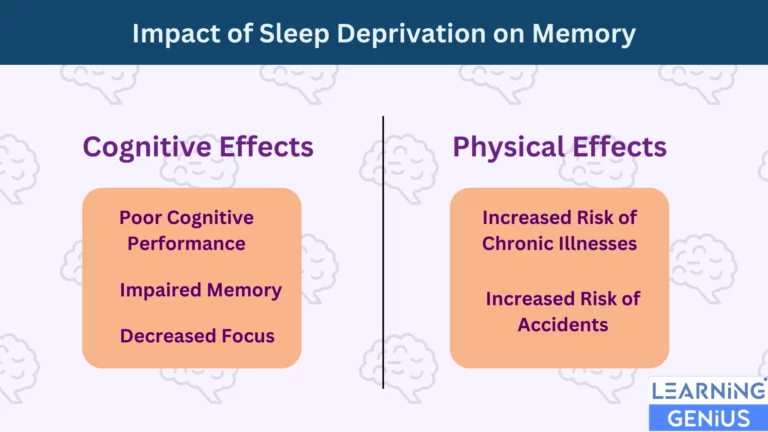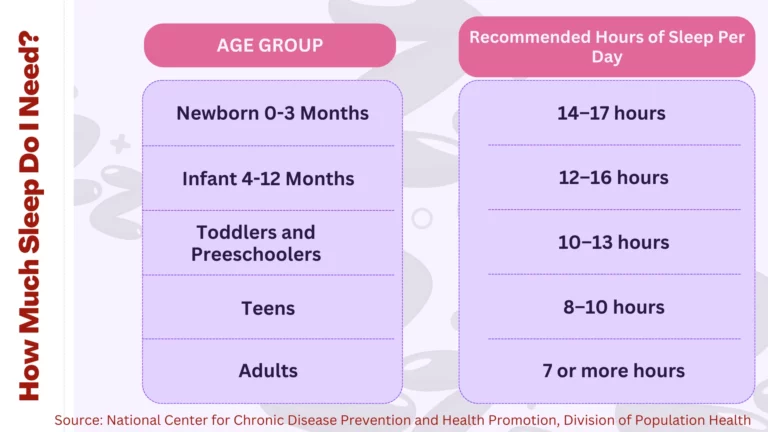Do you ever wake up feeling like you’ve just run a marathon, even though you only went to bed a few hours prior?
Or struggle to recall information that you studied the night before?
It turns out, the quality of your sleep is just as important as exercise, and diet.
But how exactly does sleep impact our brain function?
Good sleep habits have been linked to better learning and recall, better problem-solving skills, and improved motor memory.
In this blog, we’ll delve into the mysterious world of sleep and memory. From the link between good sleep habits and enhanced learning and problem-solving skills to the surprising ways your sleep affects memory consolidation.
Table of Contents
ToggleThe Role of Sleep in Memory Formation
Think of your brain as a librarian, responsible for organizing and preserving all of your memories.
Now imagine that librarian working tirelessly throughout the night, categorizing and shelving each memory in its proper place. That’s exactly what happens during sleep – our brain is busy constructing neural connections and preserving memories through the process of consolidation, deciding which ones are worth keeping and strengthening the important ones.
But here’s the catch: If our librarian (i.e. brain) doesn’t get enough rest, they can’t perform their job effectively. When you don’t get enough sleep, your brain struggles to process and store new memories, leading to a foggy recollection of important information. It’s like trying to find a book in a library that’s been hit by a tornado – everything is jumbled and disorganized.
On the other hand, getting a good night’s sleep is like giving your brain a superhero boost. Not only does it help with memory formation, but it also sharpens our focus, speeds up learning, and enhances our problem-solving skills.
The Impact of Sleep Deprivation on Memory
Lack of sleep can have far-reaching consequences that go beyond just feeling tired the next day. Here are just a few of the ways that sleep deprivation can impact your life:

1. Cognitive Effects:
Poor Cognitive Performance:
Imagine trying to solve a complex math problem while your mind is foggy and slow. That’s what it feels like when we’re sleep-deprived – our ability to think critically and solve problems is diminished.
Impaired Memory:
Just like a library with too many books, when we don’t get enough sleep, our brain becomes cluttered and unable to effectively store new memories. This leads to difficulty recalling important information and forming new memories.
Decreased Focus:
Trying to pay attention in a meeting or class when you’re exhausted is like trying to listen to a lecture while sitting on a rollercoaster. It’s just not going to happen. Lack of sleep leads to decreased focus and attention, making it difficult to stay alert and on task.
2. Physical Health
Increased Risk of Chronic Illnesses:
Think of sleep as the oil that keeps our engine running smoothly. Without it, our physical health can suffer. Studies have linked sleep deprivation to an increased risk of chronic illnesses such as heart disease, diabetes, and obesity.
Increased Risk of Accidents:
Just like a car with worn-out brakes, a sleep-deprived body is less able to respond quickly and effectively to unexpected situations. This can lead to an increased risk of accidents due to decreased alertness and reaction time.
Factors That Influence Memory Consolidation
In addition to the amount of time spent asleep, there are other factors that can influence memory consolidation, like:
Stress
Stress can interfere with the quality of sleep, leading to fragmented, restless nights. And when we don’t get good quality sleep, it can impact our ability to form new memories.
Age
Have you noticed a difference in your ability to remember things as you’ve gotten older? As we age, our ability to form new memories may diminish, while older memories tend to stay intact.
Diet
Do you ever feel like your brain is a little fuzzy after a heavy meal? Eating a balanced diet with plenty of healthy fats and proteins can help to support memory formation.
Exercise
Do you feel more alert after a workout? Regular exercise has been linked to improved cognitive function and memory.
Are you constantly forgetting names, dates, or important details?
Don’t let forgetfulness hold you back any longer. Sign up for the Everest Memory course today and start climbing towards a more confident, productive, and memorable tomorrow!
Strategies to Improve Memory and Sleep Quality
The good news is that there are strategies we can use to improve both our memory and our sleep quality.
Establish a Sleep Routine
Going to bed and waking up at the same time every day can help regulate your body’s natural sleep rhythm, leading to more restful sleep. Your body will perform better when it knows what to expect.
Turn off Electronics
Blue light from electronic devices like phones and laptops can suppress the production of melatonin, the hormone that regulates sleep. By turning off these devices at least an hour before bedtime, you can promote more peaceful slumber and reduce stress levels.
Create a Relaxing Bedroom Environment
A quiet and comfortable sleep environment can greatly improve the quality of your sleep. Try using earplugs to block out noise, an eye mask to block out light, and a comfortable mattress and pillows to support your body.
Exercise Regularly
Exercise increases the production of endorphins, which can help reduce stress and improve mood. Furthermore, regular physical activity can lead to more restful sleep, as well as increased alertness during the day. It’s a win-win!
Implement Relaxation Techniques
Practicing relaxation techniques like deep breathing, meditation, or yoga can help calm your mind and reduce stress levels before bedtime. These can help you fall asleep faster and enjoy a more restful night’s sleep
Evaluating Your Own Memory and Sleep Habits
If you’re having difficulty remembering things or suffering from mental fatigue, it could be time to evaluate your own memory and sleep habits.
To start, take an honest assessment of your sleep patterns.
How many hours of sleep are you getting each night on average?
Do you take naps during the day?
And are there any habits or activities that may be impacting the quality of your sleep?

Understanding these factors will help you identify where you can make changes to improve your sleep.
Remember, the amount of sleep you need can vary from person to person, so it’s important to listen to your own body and figure out what works best for you.
And don’t forget about the quality of your sleep. If you’re having trouble falling asleep or staying asleep, it may be time to take steps to improve your sleep environment or habits.
Keeping a sleep journal is also a great way to track and improve your sleep habits. By recording information such as bedtime, wake-up time, and any disruptions or difficulties with sleep, you can get a clear picture of your sleep patterns and identify any areas for improvement.
Sleep Hygiene Tips
Comfortable Clothes
Invest in comfortable sleepwear that allows your skin to breathe and reduces the risk of sweating. Consider purchasing pajamas made of soft, natural fibers like cotton or silk.
Room Temperature
Keep your bedroom cool and well-ventilated to encourage deep sleep. Opt for a temperature between 60-67°F.
Bed Linens
Regularly change and wash your bed sheets, pillow covers, and duvet covers to maintain a clean and fresh sleeping environment
Reading
Spend some quiet time reading a book before bed. The act of reading can help to calm your mind and relax your body, making it easier to fall asleep.
Journaling
Writing down your thoughts and feelings in a journal before bed can help you process your day and relieve stress.
5 Common Myths About Sleep and Memory
There are several common myths about sleep and memory that are widely believed but are not necessarily true. Some of these myths include:
1. More sleep is always better
While getting enough sleep is important, getting too much sleep can actually have negative effects on your memory and overall health. Aiming for 7-9 hours of sleep per night is generally recommended.
2. Napping during the day will affect your night-time sleep
While napping can impact your sleep, a short power nap of 20-30 minutes during the day can actually help improve your memory and cognitive performance.
3. You can "catch up" on sleep on weekends
While it’s true that you can make up for some lost sleep by sleeping longer on weekends, this can actually throw off your internal sleep-wake cycle and make it harder to fall asleep at night.
4. A night of good sleep means you'll have vivid dreams
Dreams are not a guarantee of good quality sleep. In fact, many people don’t remember their dreams at all. The quality of your sleep is more closely related to factors such as the depth of your sleep and the amount of time you spend in different sleep stages.
3. Laying in bed awake won't affect your sleep
Just because you’re lying in bed doesn’t mean you’re sleeping. If you find yourself lying in bed awake for long periods of time, it’s important to get up and do a relaxing activity, such as reading or meditating, until you feel tired enough to fall asleep.
Frequently Asked Questions
We asked Dr. Hayley Nelson, a neuroscientist, tenured psychology professor, international speaker, and founder of The Academy of Cognitive and Behavioral Neuroscience the Frequently Asked Questions on sleep and how it affects memory. Here are her answers.
- Can memory loss from sleep deprivation be reversed?
“Yes, memory loss from short-term sleep deprivation can be reversed with adequate and restful sleep. The effects of chronic sleep deprivation on memory can be reversed to some extent with adequate and restful sleep. Chronic sleep deprivation can lead to long-term changes in the brain that can affect memory and cognitive function, but getting adequate and restful sleep can help to improve cognitive performance and memory recall.
It’s important to note that the extent to which memory loss from chronic sleep deprivation can be reversed may depend on several factors, including the duration and severity of sleep deprivation, the age of the person, and their overall health and well-being.”
- Does sleep deprivation have an impact on short-term memory?
“ Yes, sleep deprivation can have a significant impact on short-term memory. When we are sleep deprived, our ability to consolidate new information and retrieve stored memories is reduced, making it harder to focus and retain information.”
- Does sleeping after studying help memory?
“Yes. Sleeping after studying can help improve memory in several ways including memory consolidation, improved Recall, enhanced learning, and reduces stress. It’s important to note that the benefits of sleeping after studying can vary depending on individual factors such as sleep quality and the amount of sleep obtained, so it’s best to try to get adequate and restful sleep each night to optimize memory and cognitive function.”
- At what stage of sleep does memory consolidation occur?
“Memory consolidation occurs primarily during slow-wave sleep, which occurs during the deep stages of non-rapid eye movement (NREM) sleep. During this stage, the brain processes and stores information from the day, helping to consolidate new memories and strengthen existing ones.
Memory consolidation and rapid eye movement (REM) sleep are also linked. REM sleep is a stage of sleep characterized by intense brain activity and eye movements, and it is considered to play an important role in memory and learning.”
- Can too much sleep cause memory loss?
“No, too much sleep does not cause memory loss. However, having poor quality sleep, such as sleep that is disrupted or does not provide enough time in deep sleep stages, can affect memory consolidation and cognitive function. On the other hand, getting adequate and restful sleep is important for maintaining good cognitive health and improving memory recall.”
Fancy Tripling Your Memory?
If you are tired of constantly losing your train of thought during important presentations or lectures, or struggling to remember deadlines, names, and important dates, it’s time to take control of your memory with the Everest Memory course by Nelson Dellis, the 5-time USA Memory Champion.
This comprehensive course is designed to help you unlock your full memory potential, so you can impress your classmates and colleagues with your newfound ability to remember anything and everything.
With the proven techniques and strategies taught by Nelson, you’ll be able to recall information quickly and effortlessly, giving you a significant edge in your studies and work.
Don’t let forgetfulness hold you back any longer. Sign up for the Everest Memory course today and start climbing towards a more confident, productive, and memorable tomorrow!
Unlock Your Memory Potential: Say Goodbye to Forgotten Faces, Names, and Numbers
Take control of your memory with Nelson Dellis’ (5X USA Memory Champion) proven Memorization techniques



